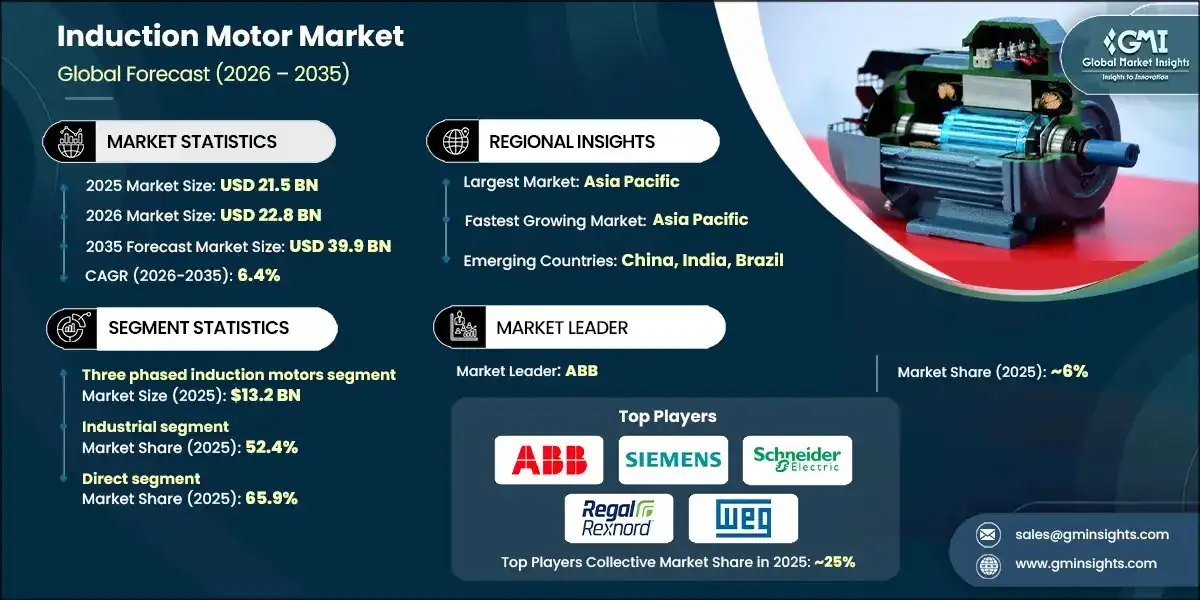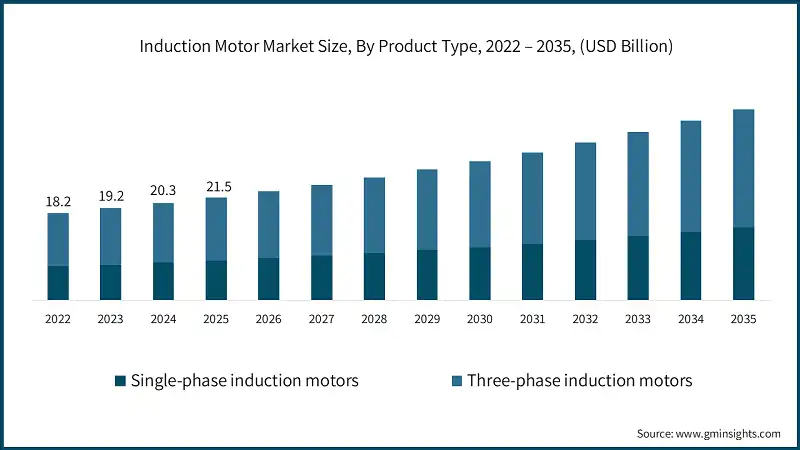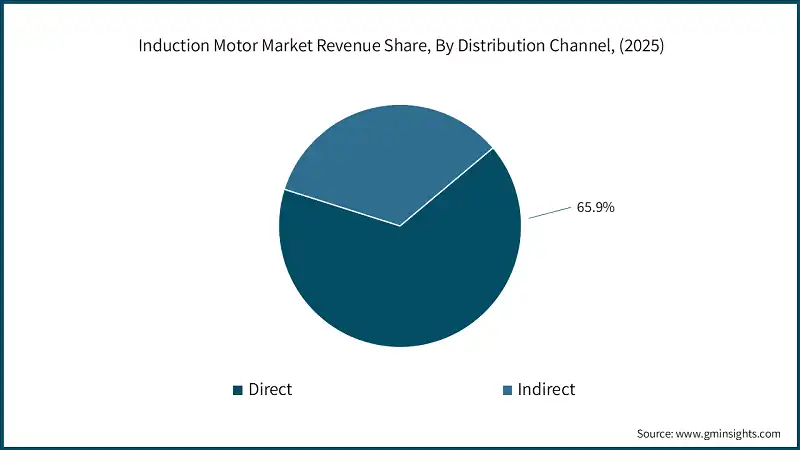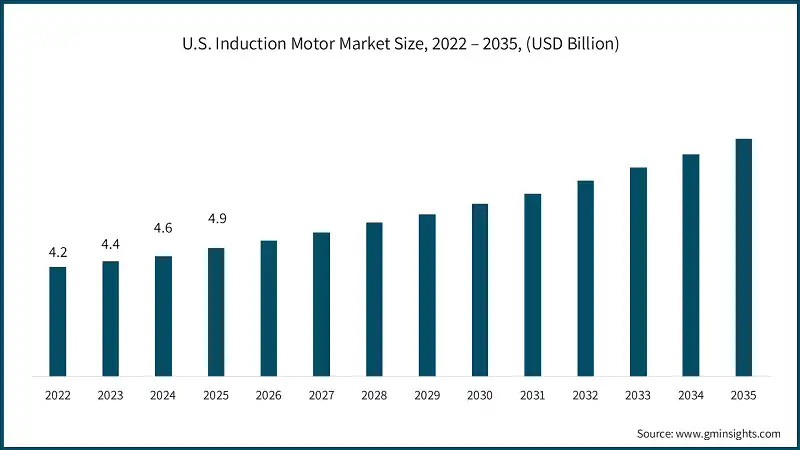Summary
Table of Content

Induction Motor Market
Get a free sample of this report
Form submitted successfully!
Error submitting form. Please try again.
Thank you!
Your inquiry has been received. Our team will reach out to you with the required details via email. To ensure that you don't miss their response, kindly remember to check your spam folder as well!

Request Sectional Data
Thank you!
Your inquiry has been received. Our team will reach out to you with the required details via email. To ensure that you don't miss their response, kindly remember to check your spam folder as well!
Form submitted successfully!
Error submitting form. Please try again.
Induction Motor Market Size
The induction motor market was estimated at USD 21.5 billion in 2025. The market is expected to grow from USD 22.8 billion in 2026 to USD 39.9 billion in 2035, at a CAGR of 6.4% according to latest report published by Global Market Insights Inc.

To get key market trends
- Most automatic machines use induction motors because they are durable, efficient, and versatile. As more companies continue to automate their processes to help produce more goods at a reduced cost through less labor, there is also an increase in the use of induction motors. Robots and automated guided vehicles (AGVs) are being utilized in manufacturing, warehouse, and logistics applications and in the healthcare sector; both utilize induction motors due to the ability of induction motors to deliver consistent torque and speed. As the demand for energy efficiency continues to grow, many companies are now using energy-efficient supply sources.
- Induction motors are critical in that they are some of the most energy-efficient electric motor types, especially when paired with variable frequency drives (VFDs). This characteristic makes them the preferred type of motor in automation-driven businesses due to the need for energy savings. Automation has also become popular in industries such as the aerospace and defense industry, where the need for accuracy and speed will lead to greater use of robotics and automated systems. Induction motors will play a critical role in these industries by powering the automatic assembly lines, test stations, and manufacturing stations where parts for planes, missiles and drones are produced.
- New developments in technology such as high-performance windings, better insulators, and next-generation rotor designs have significantly decreased the energy lost from the operation of induction motors, resulting in increased overall performance. Examples of high-performance induction motors (e.g., IE3 and IE4) have advanced designs that also reduce both core losses and heat generated and provide superior overall operating characteristics while using less energy than traditional induction motors. The HVAC industry is one of the largest users of induction motors and has greatly benefited from the enhanced efficiency of these new products. With an increase in demand for energy-efficient heating and air conditioning systems, the increased use of induction motors with new energy-saving technologies has also occurred.
Induction Motor Market Report Attributes
| Key Takeaway | Details |
|---|---|
| Market Size & Growth | |
| Base Year | 2025 |
| Market Size in 2025 | USD 21.5 Billion |
| Market Size in 2026 | USD 22.8 Billion |
| Forecast Period 2026-2035 CAGR | 6.4% |
| Market Size in 2035 | USD 39.9 Billion |
| Key Market Trends | |
| Drivers | Impact |
| Increasing industrial automation | The surge in industrial automation across manufacturing, automotive, and process industries is driving demand for induction motors. These motors are preferred for their durability, efficiency, and ability to handle variable loads in automated systems. |
| Rising demand for energy-efficient solutions | Energy efficiency regulations and sustainability goals are pushing industries to adopt high-efficiency induction motors. These motors help reduce operational costs and comply with global energy standards, making them a key choice for modern facilities. |
| Expansion of the electric vehicle (EV) market | The growing EV market is creating opportunities for induction motors, especially in traction applications. Their robustness and cost-effectiveness make them suitable for EV drivetrains, supporting the shift toward electrification. |
| Pitfalls & Challenges | Impact |
| High initial cost for energy-efficient motors | Despite long-term savings, the upfront cost of premium energy-efficient induction motors remains a barrier for small and medium enterprises. This challenge slows adoption in cost-sensitive markets. |
| Maintenance and operational challenges | Induction motors require regular maintenance to ensure optimal performance, particularly in harsh industrial environments. Issues like overheating, bearing wear, and insulation failure can lead to downtime and increased operational costs. |
| Opportunities: | Impact |
| Integration with Smart and IoT Systems | The growing adoption of smart factories and IoT-enabled solutions creates an opportunity for induction motors with advanced monitoring and control features. Manufacturers can develop motors that integrate with predictive maintenance systems, improving efficiency and reducing downtime. |
| Expansion in Renewable Energy and EV Applications | The shift toward renewable energy projects and electric vehicles opens new avenues for induction motors in wind turbines, solar tracking systems, and EV drivetrains. This trend supports long-term growth as industries move toward sustainability and electrification. |
| Market Leaders (2025) | |
| Market Leaders |
Market share of ~6% |
| Top Players |
|
| Competitive Edge |
|
| Regional Insights | |
| Largest Market | Asia Pacific |
| Fastest Growing Market | Asia Pacific |
| Emerging Country | China, India, Brazil |
| Future Outlook |
|
What are the growth opportunities in this market?
Induction Motor Market Trends
- Governments and industries worldwide are prioritizing energy-efficient solutions to meet sustainability targets and reduce operational expenses. Premium efficiency induction motors are at the forefront of this shift, offering enhanced performance and lower energy consumption. These motors are designed to minimize energy losses, making them a preferred choice for applications where energy efficiency is critical. As regulatory bodies enforce stricter energy efficiency standards, the demand for these motors is expected to grow significantly during the forecast period. Industries such as manufacturing, HVAC, and water treatment are increasingly adopting premium efficiency induction motors to align with global energy conservation goals.
- The integration of internet of things (IoT) and smart technologies is transforming the induction motor market. Modern induction motors are now equipped with advanced sensors and connectivity features, enabling real-time monitoring and predictive maintenance. These capabilities allow industries to optimize motor performance, reduce downtime, and extend equipment lifespan. This trend aligns with the principles of Industry 4.0, where interconnected systems and data-driven decision-making are key drivers of operational efficiency.
- The rapid growth of the electric vehicle (EV) market is creating new opportunities for induction motors, particularly in traction systems. Induction motors are valued for their robustness, cost-effectiveness, and ability to deliver high torque at varying speeds, making them ideal for EV applications.
- Induction motors are playing a crucial role in the global transition to renewable energy. These motors are widely used in wind turbines, solar tracking systems, and other renewable energy applications due to their reliability and efficiency. For example, in wind energy systems, induction motors are employed to adjust turbine blades and optimize energy capture.
- The increasing adoption of automation and robotics in manufacturing is driving the demand for reliable and efficient induction motors. These motors are essential for powering automated systems and handling variable loads in dynamic industrial environments. Industries such as automotive, electronics, and food processing are leveraging induction motors to enhance productivity, reduce operational costs, and maintain consistent quality.
- Manufacturers are increasingly focusing on localized production and advanced manufacturing techniques to reduce costs and comply with regional regulations. This shift is driven by the need to minimize supply chain disruptions, lower transportation expenses, and meet local content requirements. By establishing production facilities closer to end markets, manufacturers can respond more effectively to customer demands and regulatory changes.
Induction Motor Market Analysis Based on product type, the market is categorized into single-phase induction motors and three-phase induction motors. The three-phase induction motors segment accounted for revenue of around USD 13.2 billion in 2025 and is anticipated to grow at a CAGR of 6.5% from 2026 to 2035. Based on applications, the induction motor market consists of residential, commercial and industrial. The industrial segment emerged as leader and held 52.4% of the total market share in 2025 and is anticipated to grow at a CAGR of 6.2% from 2026 to 2035. Based on distribution channel, induction motor market consists of direct and indirect. The direct segment emerged as leader and held 65.9% of the total market share in 2025. The U.S. dominates an overall North America induction motor market and valued at USD 4.9 billion in 2025 and is estimated to grow at a CAGR of 6.4% from 2026 to 2035. In the European induction motor market, Germany is expected to experience significant and promising growth from 2026 to 2035. In the Asia Pacific induction motor market, the China held 31% share in 2025 and is anticipated to grow at a CAGR of 6.8% from 2026 to 2035. In the Middle East and Africa induction motor market, Saudi Arabia held 35.7% share in 2025 promising growth from 2026 to 2035. Major players operating in the induction motor industry include: Regal Rexnord differentiates through a unique blend of high?efficiency motors and mechanical power transmission, enabling system?level efficiency gains beyond the motor alone. Its portfolio targets demanding duty cycles in material handling, conveyors, and industrial fans/pumps, where reliability and total cost of ownership matter most. WEG’s advantage is cost?competitive, high?quality manufacturing at global scale spanning motors, drives, generators, and automation combined with fast customization for regional standards and harsh environments. Learn more about the key segments shaping this market
Learn more about the key segments shaping this market Learn more about the key segments shaping this market
Learn more about the key segments shaping this market Looking for region specific data?
Looking for region specific data?Induction Motor Market Share
Induction Motor Market Companies
Induction Motor Industry News
The induction motor market research report includes in-depth coverage of the industry, with estimates & forecast in terms of revenue (USD Billion) and volume (Thousand Units) from 2022 to 2035, for the following segments:
Market, By Product Type
- Single-phase induction motors
- Split phase
- Capacitor-start
- Capacitor-run
- Shaded pole
- Three-phase induction motors
- Squirrel cage motors
- Slip ring motors
Market, By Application
- Household appliances
- Commercial appliances
- Industrial applications
Market, By Distribution Channel
- Direct
- Indirect
The above information is provided for the following regions and countries:
- North America
- U.S.
- Canada
- Europe
- Germany
- UK
- France
- Italy
- Spain
- Asia Pacific
- China
- Japan
- India
- South Korea
- Australia
- Latin America
- Brazil
- Mexico
- Argentina
- MEA
- Saudi Arabia
- UAE
- South Africa
Frequently Asked Question(FAQ) :
Who are the key players in the induction motor market?
Key players include ABB, Allied Motion Technologies, AMETEK, Emerson, Hitachi, Johnson Electric, Mitsubishi, Nidec, Oriental Motor, Regal Rexnord, Rockwell Automation, Schneider Electric, Siemens, Toshiba, WEG Electric.
What market share did the direct distribution channel hold in 2025?
The direct distribution segment led with 65.9% market share in 2025, supported by customized solutions, competitive pricing, and strong end-user relationships.
Which region is the largest market for induction motors?
The U.S. led the North America induction motor market with a valuation of USD 4.9 billion in 2025 and is projected to grow at a CAGR of 6.4% through 2035.
What are the upcoming trends in the induction motor market?
Key trends include integration of IoT and smart technologies for predictive maintenance, adoption of premium efficiency motors like IE3/IE4/IE5, expansion in EV traction and renewable energy applications, and Industry 4.0 automation.
What was the market share of the industrial applications segment in 2025?
The industrial segment held 52.4% of the total market share in 2025 and is expected to grow at a CAGR of 6.2% from 2026 to 2035, driven by automation in manufacturing and process industries.
How much revenue did the three-phase induction motors segment generate in 2025?
Three-phase induction motors accounted for around USD 13.2 billion in 2025, while growing at a CAGR of 6.5% expected through 2035 due to their efficiency in heavy-duty industrial applications.
What is the market size of the induction motor market in 2025?
The market size was USD 21.5 billion in 2024, with a CAGR of 6.4% expected through 2034, driven by widespread adoption in durable and efficient automated machinery.
What is the projected value of the induction motor market by 2035?
The induction motor market is expected to reach USD 39.9 billion by 2035, propelled by industrial automation, energy efficiency demands, and EV market expansion.
What is the growth outlook for the induction motor market from 2026 to 2035?
The market size is projected to reach USD 22.8 billion in 2026.
Induction Motor Market Scope
Related Reports


